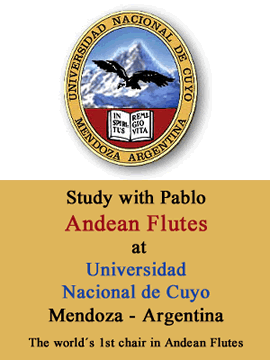
World Flutes Master

Take care of our enviroment

comprar

Peace web theme set courtesy of Crystal Cloud Graphics web set icon
Crystal Cloud Graphics
Crystal Cloud Graphics

Pi sen
Pi sen is a wind instrument with free-vibrated reed of Thai people in Son La province. Pi sen is made from a hornless bamboo tube of 71 cm long, and 1.5cm or 2 cm diameter, with one node-closed end.
A rectangular hole of 1cm x 2cm dimension is pierced just near to the node and placed with a bronze reed of isosceles triangular shape.
There are 7 fingering holes on the tube, of which, the top fingering hole is on the other side of the tube and 27cm from the blowing hole while the second hole is 3cm from the top hole but on the front side of tube. The 5 other holes are vertically arranged with the second hole and also in equal distance of 3 cm, except for the forth and the fifth holes that are 6 cm from each other. Between reed and the fingering second hole, one more hole is made and covered with a membrane of hornless bamboo's loin or spider's eggshell.
When being played, this membrane will be vibrated producing cracked sounds. Range of Pi sen consists of Sol, Si, Reb1, Mi1, Fa1, Sol1, La1, Si1. When playing Pi sen, instrumentalist holds it horizontally and slightly diagonally down. The instrumentalist holds in his mouth the whole reed end and continuously blows into the tube, and consequently producing ceaselessly sounds when Pi sen is played.
Pi sen employs techniques such as tongue fluttering, appoggiatura, and tremolo. Timbres of Pi sen are deep and cracked, and imbued with mysteriousness. Pi sen used to be played in accompaniment with singing by shamans during services. Nowadays, Pi sen becomes the popular musical instrument of Thai people in their daily activities.
Pi sen is a wind instrument with free-vibrated reed of Thai people in Son La province. Pi sen is made from a hornless bamboo tube of 71 cm long, and 1.5cm or 2 cm diameter, with one node-closed end.
A rectangular hole of 1cm x 2cm dimension is pierced just near to the node and placed with a bronze reed of isosceles triangular shape.
There are 7 fingering holes on the tube, of which, the top fingering hole is on the other side of the tube and 27cm from the blowing hole while the second hole is 3cm from the top hole but on the front side of tube. The 5 other holes are vertically arranged with the second hole and also in equal distance of 3 cm, except for the forth and the fifth holes that are 6 cm from each other. Between reed and the fingering second hole, one more hole is made and covered with a membrane of hornless bamboo's loin or spider's eggshell.
When being played, this membrane will be vibrated producing cracked sounds. Range of Pi sen consists of Sol, Si, Reb1, Mi1, Fa1, Sol1, La1, Si1. When playing Pi sen, instrumentalist holds it horizontally and slightly diagonally down. The instrumentalist holds in his mouth the whole reed end and continuously blows into the tube, and consequently producing ceaselessly sounds when Pi sen is played.
Pi sen employs techniques such as tongue fluttering, appoggiatura, and tremolo. Timbres of Pi sen are deep and cracked, and imbued with mysteriousness. Pi sen used to be played in accompaniment with singing by shamans during services. Nowadays, Pi sen becomes the popular musical instrument of Thai people in their daily activities.
Text and Photos courtesy by Vietnam Datacommunication Company (VDC)
and Vietnamese Institute for Musicology (V.I.M)
and Vietnamese Institute for Musicology (V.I.M)








